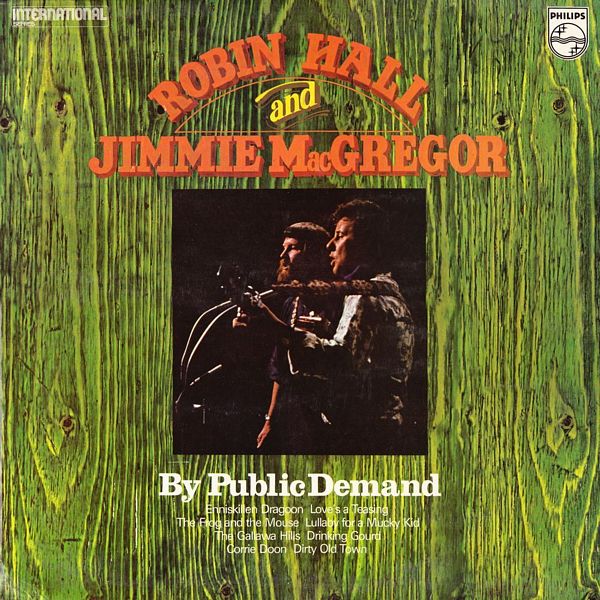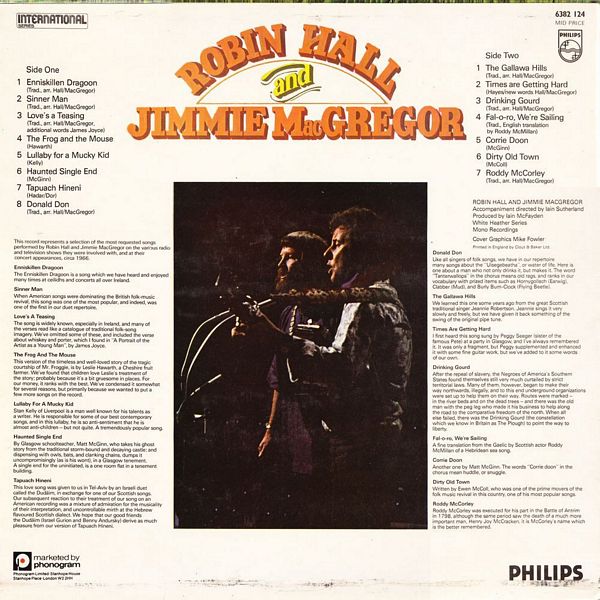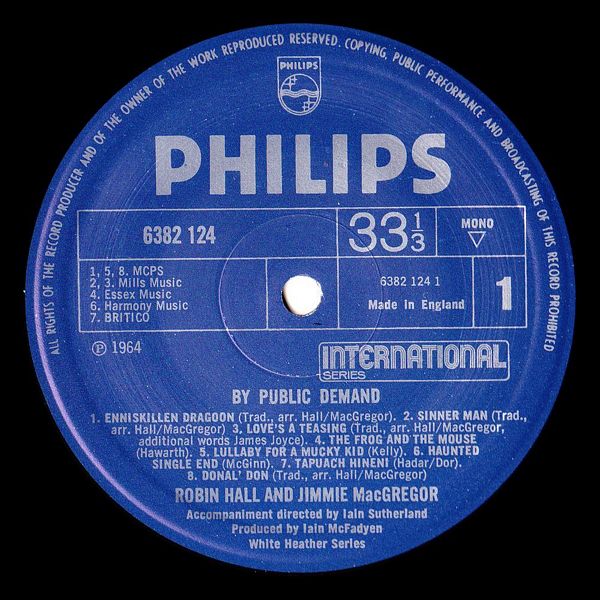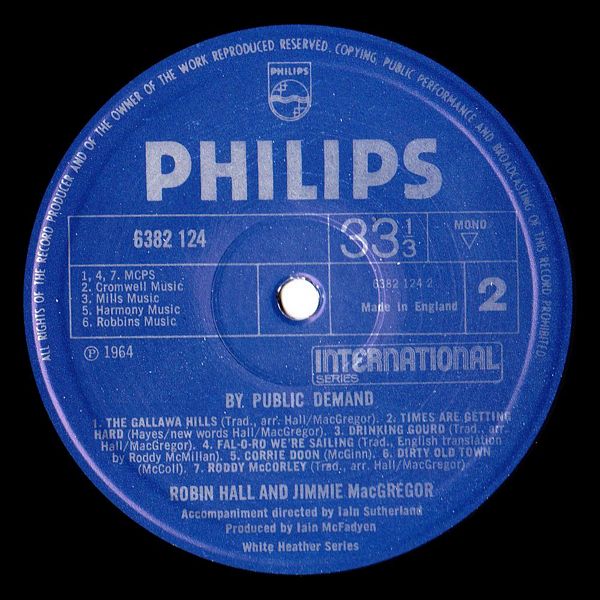

 |



|
Sleeve Notes
This record represents a selection of the most requested songs performed by Robin Hall and Jimmie MacGregor on the various radio and television shows they were involved with, and at their concert appearances, circa 1966.
Enniskillen Dragoon — The Enniskillen Dragoon is a song which we have heard and enjoyed many times at ceilidhs and concerts all over Ireland.
Sinner Man — When American songs were dominating the British folk-music revival, this song was one of the most popular, and indeed, was one of the first in our duet repertoire.
Love's A Teasing — The song is widely known, especially in Ireland, and many of the verses read like a catalogue of traditional folk-song imagery. We've omitted some of these, and included the verse about whiskey and porter, which I found in "A Portrait of the Artist as a Young Man", by James Joyce.
The Frog And The Mouse — This version of the timeless and well-loved story of the tragic courtship of Mr. Froggie, is by Leslie Hawarth, a Cheshire fruit farmer. We've found that children love Leslie's treatment of the story; probably because it's a bit gruesome in places. For our money, it ranks with the best. We've condensed it somewhat for several reasons, but primarily because we wanted to put a few more songs on the record.
Lullaby For A Mucky Kid — Stan Kelly of Liverpool is a man well known for his talents as a writer. He is responsible for some of our best contemporary songs, and in this lullaby, he is so anti-sentiment that he is almost anti-children — but not quite. A tremendously popular song.
Haunted Single End — By Glasgow schoolteacher, Matt McGinn, who takes his ghost story from the traditional storm-bound and decaying castle; and dispensing with owls, bats, and clanking chains, dumps it uncompromisingly (as is his wont), in a Glasgow tenement.
A single end for the uninitiated, is a one room flat in a tenement building.
Tapuach Hineni — This love song was given to us in Tel-Aviv by an Israeli duet called the Dudaim, in exchange for one of our Scottish songs.
Our subsequent reaction to their treatment of our song on an American recording was a mixture of admiration for the musicality of their interpretation, and uncontrollable mirth at the Hebrew flavoured Scottish dialect. We hope that our good friends the Dudaim (Israel Gurion and Benny Amdursky) derive as much pleasure from our version of Tapuach Hineni.
Donald Don — Like all singers of folk songs, we have in our repertoire many songs about the "Uisegebeatha", or water of life. Here is one about a man who not only drinks it, but makes it. The word 'Tanterwallops" in the chorus means old rags, and ranks in our vocabulary with prized items such as Hornygollach (Earwig),
Clabber (Mud), and Burly Bum-Clock (Flying Beetle).
The Gallawa Hills — We learned this one some years ago from the great Scottish traditional singer Jeannie Robertson. Jeannie sings it very slowly and freely, but we have given it back something of the swing of the original pipe tune.
Times Are Getting Hard — I first heard this song sung by Peggy Seeger (sister of the famous Pete) at a party in Glasgow, and I've always remembered it. It was only a fragment, but Peggy supplemented and enhanced it with some fine guitar work, but we've added to it some words of our own.
Drinking Gourd — After the repeal of slavery, the Negroes of America's Southern States found themselves still very much curtailed by strict territorial laws. Many of them, however, began to make their way northwards, illegally, and to this end underground organizations were set up to help them on their way. Routes were marked — in the river beds and on the dead trees — and there was the old man with the peg leg who made it his business to help along the road to the comparative freedom of the north. When all else failed, there was the Drinking Gourd (the constellation which we know in Britain as The Plough) to point the way to liberty.
Fal-o-ro, We're Sailing — A fine translation from the Gaelic by Scottish actor Roddy McMillan of a Hebridean sea song.
Corrie Doon — Another one by Matt McGinn. The words "Corrie doon" in the chorus mean huddle, or snuggle.
Dirty Old Town — Written by Ewen McColl, who was one of the prime movers of the folk music revival in this country, one of his most popular songs.
Roddy McCorley — Roddy McCorley was executed for his part in the Battle of Antrim in 1798, although the same period saw the death of a much more important man, Henry Joy McCracken, it is McCorley's name which is the better remembered.